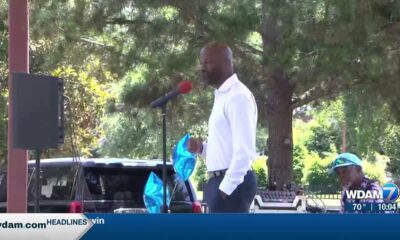Mississippi Today
Feds take over Jackson water after failures at the local and state level
Feds take over Jackson water after failures at the local and state level
Tate Reeves, during his nearly 19 years in elective office, has subscribed to the theory that a good defense is best achieved through a bold offense.
His default setting is offense.
On the day last week that an order was made public detailing the takeover by the U.S. Department of Justice of the Jackson Water System, the governor went to social media to proclaim victory. But it was not clear who was keeping score other than Reeves.
“It is excellent news for anyone who cares about the people of Jackson that the mayor (Chokwe Antar Lumumba) will no longer be overseeing the city's water system,” the governor said on social media. “It is out of the city's control and will now be overseen by a federal court.”
The beleaguered water system, which has been beset for years with boil water notices and the loss of water pressure, also is out of the control of the state of Mississippi. And, of course, the state of Mississippi is ultimately the responsibility of Gov. Jonathan Tate Reeves.
Make no mistake about it – President Joe Biden's Department of Justice is taking over the Jackson water system because both the city of Jackson and the state of Mississippi have been unable or unwilling to fix it.
Perhaps the governor should send Biden, whom he often goes on offense against, a thank you note for taking over the problem. After all, the governor made it clear he did not want to deal with the problem.
“It is a great day to be in Hattiesburg. It's also, as always, a great day to not be in Jackson,” Reeves joked during the height of the most recent shutdown when many city residents had no running water. “I feel like I should take off my emergency manager director hat and leave it in the car and take off my public works director hat and leave it in the car.”
Granted, as the governor and other state officials have often said, it is primarily the responsibility of the city to provide adequate water to the citizens of Jackson.
But ultimately, Jackson, like any municipality in Mississippi, is a creature of the state. All municipalities in the state, from Satartia in Yazoo County with less than 50 residents to Jackson, the capital city, with about 150,000 residents, were created by acts of the Mississippi Legislature.
The Mississippi Constitution reads, “The Legislature shall pass general laws … under which cities and towns may be chartered and their charters amended.”
Reeves, during his eight years as lieutenant governor presiding over the Senate, or during his three years as governor, could have advocated for legislation to deal with the Jackson water crisis that has been ongoing for years. The water crisis should not be a surprise to anyone in state government. More than once Jackson water woes resulted in portable bathrooms being parked on the grounds of the ornate Mississippi Capitol during sessions of the Legislature.
The governor and Legislature could have acted to deal with the water woes with or without the consent of officials with the city of Jackson. After all, the city, as established by the Mississippi Constitution, is a creature of the state.
And it is not as if state officials have an aversion to getting involved in the business other than water of the city of Jackson.
It was not that long ago – 2016 – that legislation originating in the Senate where Reeves presided at the time as lieutenant governor was passed and signed into law by then-Gov. Phil Bryant stripping from city officials some of the authority over the Jackson Medgar Wiley Evers International Airport. Granted, a federal lawsuit has been filed that is pending trying to block the legislation from being enacted.
But that does not diminish the fact that there were steps the state could have taken earlier to deal with the issues facing the Jackson Water System.
There are multiple other examples of the governor and the Legislature meddling in the business of Jackson and of other cities across the state. Almost on a yearly basis, legislation is considered and sometimes passed to limit the cities' authority to enact gun safety laws or to limit the cities' authority to deal with undocumented immigrants as the locally elected leaders see fit.
Does saying all of this mean that there is not blame going way back among Jackson officials for the condition of the city water system?
The answer to that question most likely is no, but with the caveat that people in the highest echelons of state government who live in glass houses perhaps should not throw stones.
This article first appeared on Mississippi Today and is republished here under a Creative Commons license.
Did you miss our previous article…
https://www.biloxinewsevents.com/?p=198559
Mississippi Today
On this day in 1967
MAY 12, 1967

Benjamin Brown, a former civil rights organizer, was shot in the back on this day in Jackson, Mississippi.
Brown had walked with a friend into the Kon-Tiki Café to pick up a sandwich to take home to his wife. On his way back, he encountered a standoff between law enforcement officers and Jackson State University students, who had been hurling rocks and bottles at them. Brown was hit in the back by three shotgun blasts. No arrests were ever made, and the Mississippi Sovereignty Commission gathered spy files on the students who protested.
Eyewitnesses pointed their fingers at then-Mississippi Highway Patrolman Lloyd Jones, who reportedly admitted his involvement in the killing. When some accused a Jackson police detective of killing Brown, Jones was quoted as replying that the detective “didn't shoot that n—–, I did.”
Jones was quoted as saying that he took the shotgun home, cleaned it, wrapped it in a blanket and placed it in an attic for a few months before returning it to service. Jones was never charged and in 1995 was killed while working as sheriff in Simpson County.
This article first appeared on Mississippi Today and is republished here under a Creative Commons license.
Mississippi Today
If you didn’t like MAEP, you may not like the new public school funding formula
House and Senate members often adjourn a legislative day in memory of a constituent or other well known person who recently died.
On the day the Mississippi House took its final vote to adopt a new school funding formula, Rep. Karl Oliver, R-Winona, asked “to adjourn in memory of the Mississippi Adequate Education plan…the failed plan.”
Oliver continued: “It has always failed and never met its expectations. Today we laid it to rest.”
House Speaker Jason White, R-West, gleefully responded that all House members might want to sign onto Oliver's adjourn in memory motion.
Of course, the Senate went on to pass the bill rewriting the Adequate Education Program and Gov. Tate Reeves, a long-time opponent of MAEP, signed the legislation into law this week, no doubt stirring much celebration for folks like Oliver and White.
But for those celebrating the demise of MAEP, be warned with a paraphrased song lyric: Meet the new school funding formula, same as the old school funding formula.
The core principle of the Mississippi Adequate Education Program lives in the new funding formula, named simply the Mississippi Student Funding Formula.
Like MAEP, the new formula uses an objective formula to determine the base student cost (amount of funding per student) and provides that amount of money multiplied by school enrollment or attendance to each local school district.
And here's the kicker: Like MAEP, the Mississippi Student Funding Formula mandates that the Legislature appropriate that amount of money annually to each local district.
The new law states plainly, “Base student cost shall not be lower than the previous year.” So that means the new law mandates lawmaker provide enough funds to pay for what will likely be an ever increasing base student cost or, if they don't want to fully fund education, they have to hope enrollment drops or they simply do like they did with MAEP and not follow the law. The new law does provide a small loophole, saying when a revenue shortfall is so severe that state budgets must be cut, education also can be reduced.
But the new law goes on to say, “If the total revenue increases the following year, the formula shall be recalculated or increased.” Just like MAEP, the amount of money called for by the formula is adjusted yearly for inflation. And it is recalculated every fourth year, meaning unless there are unusual circumstances the formula will generate more money for education each year.
For years, many politicians, including the governor, argued that the state could not afford MAEP's objective funding formula. So, while cutting taxes by more than a billion dollars annually, legislators chose to ignore the law saying MAEP “shall” be fully funded. At the same time those tax cuts were being enacted, many legislative leaders, led by then-Lt Gov. Reeves and former Speaker Philip Gunn, were trying to replace MAEP because they said it was too expensive.
During the 2024 session, new Speaker Jason White and House Education Chair Rob Roberson, R-Starkville, pulling significant help from Reps. Kent McCarty and Jansen Owen, said they wanted to rewrite MAEP not because it sent too much money to the public schools, but because it did not send enough money to poorer school districts. And, granted, the new plan has several features that help poor and at-risk students.
But the House plan, which was nearly identical to a funding formula developed by advocacy groups who support sending public funds to private schools, did not include an objective funding formula. Senate Education Chair Dennis DeBar, R-Leakesville, said it allowed the Legislature to determine “willy nilly” the amount of money to send to public schools.
DeBar and Lt. Gov. Delbert Hosemann were not among the group of legislators who opposed the objective funding formula. A matter of fact, they said they would not agree to rewrite MAEP unless the new method of sending money to public schools also was arrived at objectively. DeBar and Senate staff essentially developed the new objective formula that was placed into the House's formula rewrite.
In the haste and zeal to replace MAEP, politicians who did not like the objective formula agreed to adopt, gulp, a new objective funding formula — one that provides a little less money than MAEP, but still a significant amount and still with a mandate for the Legislature to provide that amount of funds each year.
In a lawsuit challenging the Legislature for not fully funding MAEP, the state Supreme Court ruled in 2017 that “shall” did not actually mean shall. In other words, the justices ruled that legislators did not have to fully fund MAEP even though the law said they “shall” do so.
When and if the new Mississippi Student Funding Formula is not fully funded, maybe the Supreme Court will get another chance to rule on whether legislators have to follow the laws they pass.
This article first appeared on Mississippi Today and is republished here under a Creative Commons license.
Mississippi Today
On this day in 1968
MAY 11, 1968

The Poor People's Campaign arrived in Washington, D.C. A town called “Resurrection City” was erected as a tribute to the slain Martin Luther King Jr.
King had conceived the campaign, which was led by his successor at the head of the Southern Christian Leadership Conference, Ralph David Abernathy. Civil rights leader Jesse Jackson reached out to young Black men wanting vengeance for King's assassination.
“Jackson sat them down and said, ‘This is just not the way, brothers. It's just not the way,”' recalled Lenneal Henderson, then a student at the University of California at Berkeley. “He went further and said, ‘Look, you've got to pledge to me and to yourself that when you go back to wherever you live, before the year is out, you're going to do two things to make a difference in your neighborhood.' It was an impressive moment of leadership.”
This article first appeared on Mississippi Today and is republished here under a Creative Commons license.
-
SuperTalk FM4 days ago
Mississippi governor approves bill allowing electronic search warrants
-
SuperTalk FM6 days ago
Legislation outlawing ‘squatted’ vehicles in Mississippi signed into law
-
228Sports6 days ago
PRC’s Bats Come Alive Late As Blue Devils Beat Picayune To Advance To 6A South State Title Series
-
Mississippi News5 days ago
Strong storms late Wednesday night – Home – WCBI TV
-
Mississippi News4 days ago
Louisville names street after a former high school
-
SuperTalk FM4 days ago
$30 million RV park coming to Natchez features amphitheater, pickle ball courts, and more
-
Mississippi News4 days ago
Crews close Jackson street due to large sinkhole
-
Mississippi News3 days ago
Man arrested for allegedly breaking into home, robbing owner







































